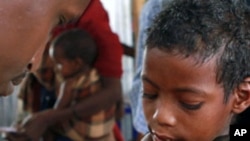The United Nations refugee agency reports death rates in one of four refugee camps at the Dollo Ado complex in Ethiopia have reached alarming levels. The UNHCR says it suspects a combination of measles and malnutrition brought on by famine is the major cause of death.
More than 118,000 Somalis live at the Dollo Ado refugee complex in Ethiopia. More than 78,000 of these refugees, fleeing drought and famine, have arrived in Dollo Ado this year.
U.N. refugee spokesman, Adrian Edwards, says an assessment of mortality finds a sharp rise in death rates in one of the four camps at Dollo Ado.
“Since the Kobe refugee camp opened in June, an average of 10 children under the age of five have been dying each day. An outbreak of suspected measles, combined with high rates of acute malnutrition is thought to be the major cause of death. Across all Dollo Ado sites, 148 cases and 11 deaths due to suspected measles have been reported. This deadly combination has historically caused similar death rates in previous famine crises in this region,” Edwards stated.
Children who are healthy generally do not die of measles. But, for those who are malnourished, this preventable disease can be fatal. And, so it is proving to be for many of the acutely malnourished Somali children, whose health has been severely weakened due to drought and famine.
Kobe houses 25,000 Somali refugees. The UNHCR and its partners on Monday completed a mass vaccination campaign against measles. All children between the ages of six months and 15 years were immunized against this killer disease.
Edwards says vaccination campaigns will begin in other camps in the coming days. “There is a need to encourage parents to return with their children to health centers for continued treatment for malnutrition, and to actively identify children who are sick to ensure they receive immediate help. UNHCR is already working with refugee leaders and outreach workers to raise awareness of measles symptoms and hygiene promotion,” he said.
Most of the refugees arriving from Somalia are from rural areas. UNHCR spokesman Edwards says the camps in Ethiopia may be the first time the Somalis have ever gone to a health care facility. He says it is crucial to make the refugees aware of the health and nutrition programs that are available to them.
He says the UNHCR, together with the Ethiopian government and other partners, are working to improve nutrition, water supply and sanitation in the camps. He says this can help bring down the high mortality rate.
Measles is a highly contagious disease. The UNHCR says action to prevent people from dying of this disease is the number one priority facing aid agencies.
Alarming Rise of Measles Deaths in Dollo Ado Refugee Complex




